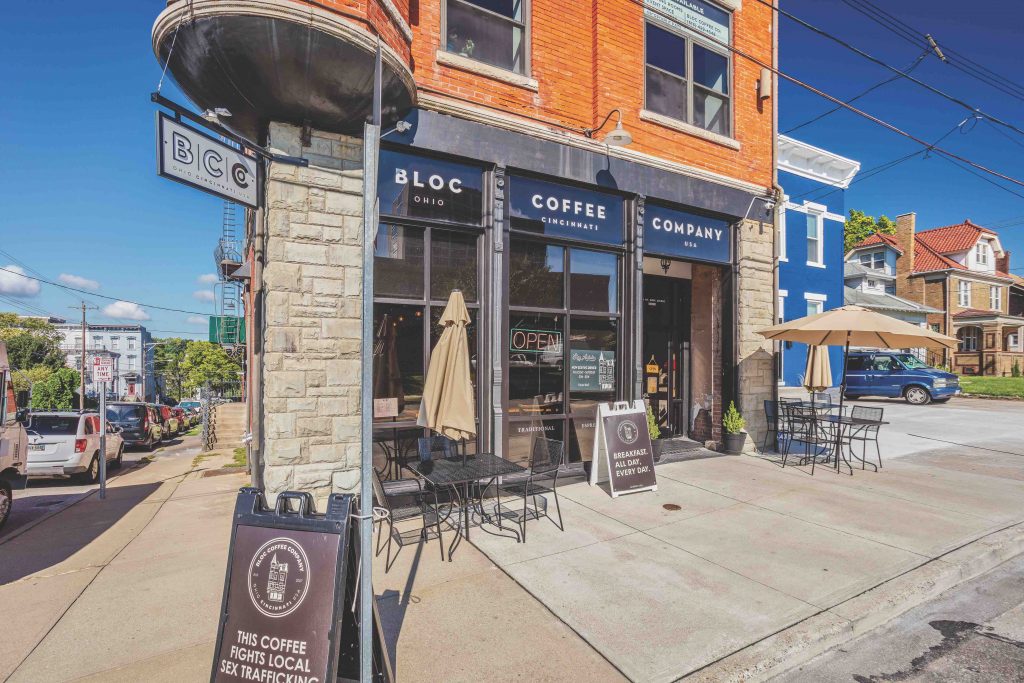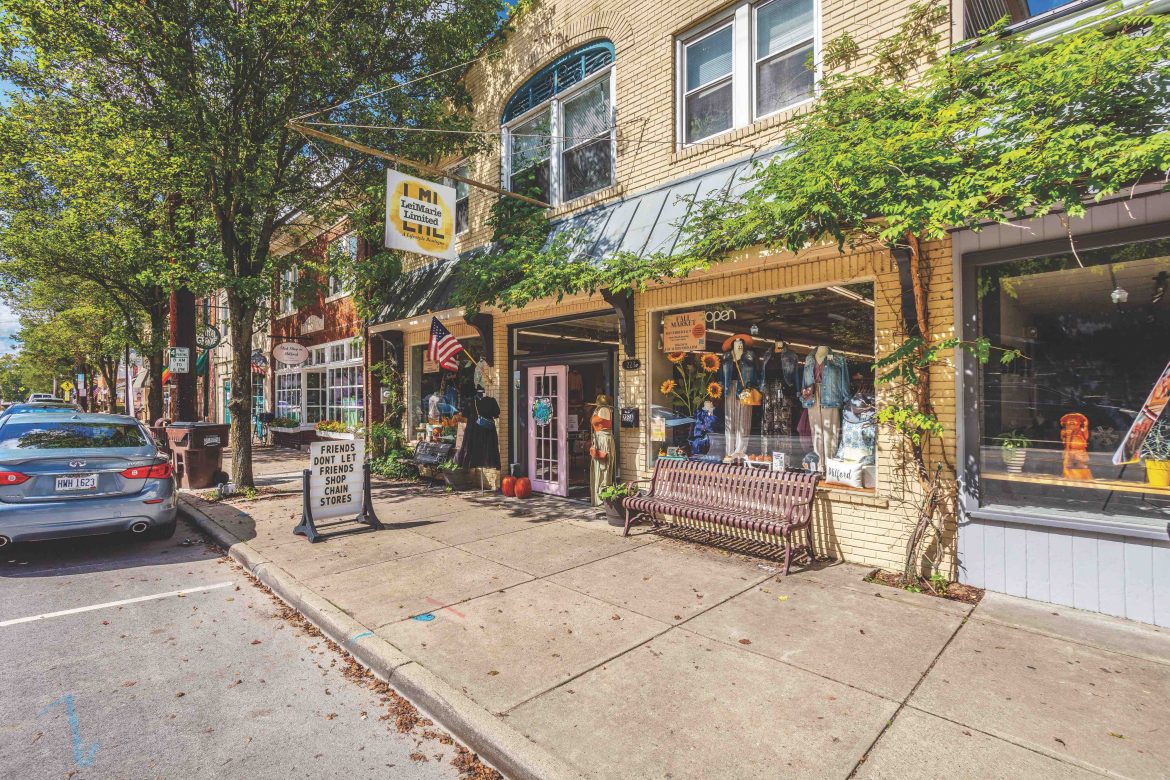Paul Miller, who owns Bircus Brewing Company in Ludlow, used to be a clown. Like a real, actual clown for the Ringling Brothers Circus. He dropped out of UC’s College-Conservatory of Music his senior year to run away and join the circus, living on a train and performing in 18 counties before retiring his red nose.
You wouldn’t think clowning around is the best preparation for a business career, but Miller has done alright with it. His Bircus venture is a combination of beers, food, entertainment, circus acts, and community, a passion project that carried on his love for performing and spread it to his Northern Kentucky community. He purchased an old movie theater in Ludlow and held concerts and events and sold beer. He’d give performing acts creative freedom to put on their own mini-circus acts there, keeping his childhood dream and former career alive in his new business.
His small business represents the heart of Ludlow and is geared toward much more than beer lovers. Family matinee shows and classes are held every weekend afternoon, and you can join a pickleball league or hang out on Wednesday Vinyl night. City residents are finding community through beer, and much more. “Ludlow has a distillery across the street now (Second Sight Spirits), which is really cool, and you can’t make this stuff up—they used to build props for Cirque du Soleil,” Miller says. “We work together a lot. We did a circus folk festival, we had Talk Like a Pirate Day. It was so much fun.”

But it’s more than just a fun time with friends. Small businesses make up the heart of Ludlow, Miller says, and support “independent creatives” such as the local boutique, the ice cream parlor, and the tavern where the owner lives upstairs. “It’s a group of people who collaborate together,” he says. “It’s cool because we’ve got all this stuff going on, and it really happened organically.”
Just over the river in Walnut Hills, another brewery owner, Marvin Abrinica, takes an active role in supporting his community by hiring skilled labor at his Esoteric Brewing. He co-founded it the height of the pandemic in September 2020 and has worked purposefully to bring Walnut Hills residents into the business. “I want to lift up the neighborhood and put dollars in the pockets of people here,” he says.
Abrinica says “esoteric” refers to a lotus flower, a symbol of “fighting through adversity” and resilience because the exotic flower endures forces of nature to blossom. Walnut Hills itself has endured in similar ways, especially after Kroger closed its grocery store there in 2017. On Fridays the brewery hosts a food drive alongside organizations like the Walnut Hills Food Collaborative, when underserved community members can pick up much-needed groceries.
“We believe that beer can change the world,” says Abrinica. “Our business is a reflection of who we are. If we can touch and improve the lives of the people around us in the neighborhood, we can be a rising tide for this community.”
Bircus and Esoteric Brewing, along with other small businesses across the region, have recently received a boost to their community-focused efforts from Storefronts to the Forefront, an initiative of Duke Energy and the Cincinnati USA Regional Chamber. Amy Spiller, Duke’s president for Ohio and Kentucky, says the program evolved from a brainstorming conversation about ways Cincinnati’s corporate community could do more to help elevate the profile of the region’s unique neighborhood business districts.
“What we really wanted to do is address the ongoing challenges that small business owners were having through the pandemic and the economic challenges that continued to plague all of us,” says Spiller. “So the purpose of this program is to highlight these unique, diverse business districts and give them access to all of the tools and development opportunities available through the Chamber.”
Spiller says she was inspired to partner on the program based on her own small-town upbringing. “I babysat for the owner of the pharmacy, and we knew the owner of the local newspaper,” she says. “There’s just such a true sense of community that’s enabled by vibrant small business districts. We have so many of those in our region, and they really are the heartbeat of the neighborhood, so we want to help support these vital assets.”
Aside from Ludlow and Walnut Hills, business districts selected for Storefronts to the Forefront include Bellevue and Ft. Thomas in Northern Kentucky and East Price Hill, Loveland, Madisonville, Milford, New Richmond, Norwood, and Reading in Ohio. Each community participates in virtual programs targeted to placemaking, business growth, and marketing and get exposure to business connections through the Chamber’s monthly e-newsletter, social media, and a video series produced by and airing on Fox19. Small businesses in each of the 11 communities receive Chamber membership access to advocacy, leadership development, cost saving programs, networking events, and more.
The initiative’s marketing support helps a business like BLOC Coffee Company continue making a difference in Price Hill. Café owner Dwight Young and his wife, Stephanie, have been working to improve living conditions on the West Side for 25 years, launching the coffee shop in 2007 as a safe and warm space for students to gather after school and adults to come together and have a conversation. Young says several businessmen who attend Holy Family Church on nearby West Eighth Street were concerned about prostitution and homelessness in the neighborhood and wanted to plant some positive roots.
“The coffee shop was the catalyst, honestly, to change this neighborhood,” says Young. “It really established a gathering place and started to function as a business and a welcoming place for people to come. Everybody from the mayor to the next-door neighbor was coming in for coffee.” The shop expanded three years ago, moving a few blocks from Price Avenue to the corner of Mt. Hope Road and West Eighth.
Young’s affiliated BLOC Ministries uses the coffee shop as a training ground and a recovery point for local residents, especially women, who learn job training skills in the Redeemed Home program. The long-term intervention program is designed to serve women survivors of trafficking, prostitution and addiction, and participants can work or sell handmade goods at the shop.

Young says he and Stephanie are particularly focused on connecting immigrants with job opportunities. For example, one of BLOC’s chefs immigrated from Puerto Rico, and Young helped her get an apartment, a car, and a job. “She’s unbelievable,” he says. “She’s a gifted woman we love, and she’s found a home here.”
The BLOC training programs are expanding further, says Young, and include getting students from five local high schools involved in culinary arts, sports training, and other vocations. “I can honestly say the stress we deal with these days is totally different than it was 25 years ago,” he says. “We’re interacting with the second and third generations of immigrant families now, and a lot of them are working and volunteering with us.”
The area around BLOC and Holy Family Church, known now as the Incline District, has developed into a bustling business district. Anchor businesses include the Warsaw Federal Incline Theater, the Incline Public House, and Veracruz Mexican Grill, along with the longtime “date night” restaurant favorite, Primavista.
Young says as many as 35 different buildings in the neighborhood, including his coffee shop, are used for BLOC Ministries and related initiatives. Remodeling that many buildings has also been a catalyst for change, he says, pointing out the number of newly painted and spruced up buildings on side streets. He’s happy to partner with community redevelopment organizations like Price Hill Will and with Duke and the Chamber in a further effort to support small businesses. “We don’t do ministry stuff on main commercial thoroughfares, because we want those buildings to rehabilitate back into what they were before, which was small businesses,” says Young. “We aren’t on main streets, because people won’t shop next door to that. You have to have both commercial and community support, but not necessarily on the same street.”
Abrinica agrees that small business success and community support go hand in hand. “Walnut Hills is one of the most diverse areas in the city, not only from a racial makeup but also a socioeconomic makeup,” he says, pointing out that Esoteric’s CEO Brian Johnson is Cincinnati’s first Black brewery owner. “Small businesses have an important role to play in reviving broken communities.”
Support from Storefronts to the Forefront and the Cincinnati Minority Business Accelerator has helped the company expand job training and neighborhood programming, and the co-founders are scouting new locations for a business expansion. Opening during the pandemic has come with a host of challenges, says Abrinica, but they’ve persevered.

Stuart Hellebusch prides himself on managing the oldest continually run bicycle shop in the U.S., Bishop’s Bicycles in Milford. The Bishop family founded the shop in 1890 in Winchester, Kentucky—it originally started as a gun shop a decade before that—and moved it to Norwood in 1910. The business eventually relocated to Milford in 1971. Hellebusch is the third owner since the Bishop family sold the business.
Carrying on a tradition that’s spanned generations brings depth and legacy to old Milford small businesses. “The vibe in Old Milford is fantastic,” says Hellebusch. “On weekends, streets are pretty full of people walking the sidewalks, checking everything out, and activity in all of the little shops. The DORA (designated outdoor refreshment area) brings in a lot of traffic spanning the whole Milford area.”
Bishop’s Bicycles has a second location nearby, at the Little Miami Trail’s Milford Trailhead location, where bikers can rent a bike or grab a snack. Storefronts to the Forefront worked with Hellebusch to feature the company on a short video advertisement, hoping to increase traffic to the bike store that some mistake for a museum. “No, we’re a functioning bike shop,” he says, noting that in a nod to the company’s heritage you can check out some 100-year-old bikes hanging around the store.
Like many neighborhood retail shops, Hellebusch says he works constantly to convince consumers to head to Milford to purchase a toddler’s first balance bike or a $6,000 competitive cyclist’s bike instead of ordering via Amazon or other online sites. “The internet isn’t going to build your bike,” he says. “The biggest difference we see is quality.”
Four or five mechanics work on bike repairs in the shop daily, says Hellebusch, and employees help accurately size for customers. “If the bike is too big, you have some safety issues,” he says. “If it’s too small, you’re not going to enjoy it.” Customized service and attention to detail are the kinds of experience people find only in a neighborhood business district like Milford, he says, and he hopes his business will properly outfit local bikers for another century or more.
There’s a truism in the brewing industry, based on pandemic statistics from the Brewer’s Association, that Abrinica says reflects the challenges every small business faces: For every brewery that opens, another closes. The State of Ohio’s 2021 Small Business Profile says that between March 2019 and March 2020 a total of 23,172 small businesses opened in the state, while 23,273 closed. That one-year timespan saw a loss of 3,556 jobs among small businesses. Almost half of the state’s workforce is employed by small businesses.
Promotional efforts such as Shop Local Saturday, scheduled this year for November 19, are essential reminders to consumers to support small businesses around the region and empower them to create and maintain vibrant communities for years to come. More than 80 percent of all U.S. businesses have fewer than 10 employees, and small businesses account for nearly half of the country’s total jobs. Holiday spending can often be a make-or-break event for small businesses.
The U.S. Chamber of Commerce says that 70 percent of small business owners label the Thanksgiving/Hannukah/Christmas holiday season as important to their overall profit, with 37 percent saying it’s “very important.” An American Express survey states that $0.67 of every $1 you spend at a small business is reinvested right back into that local community.



